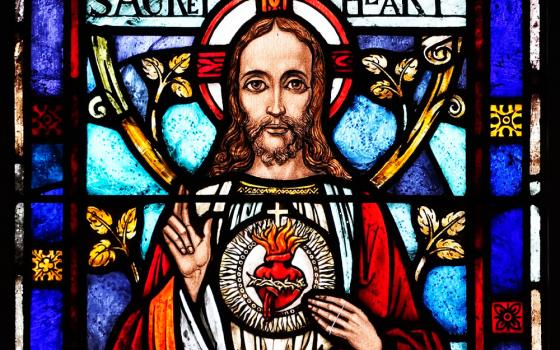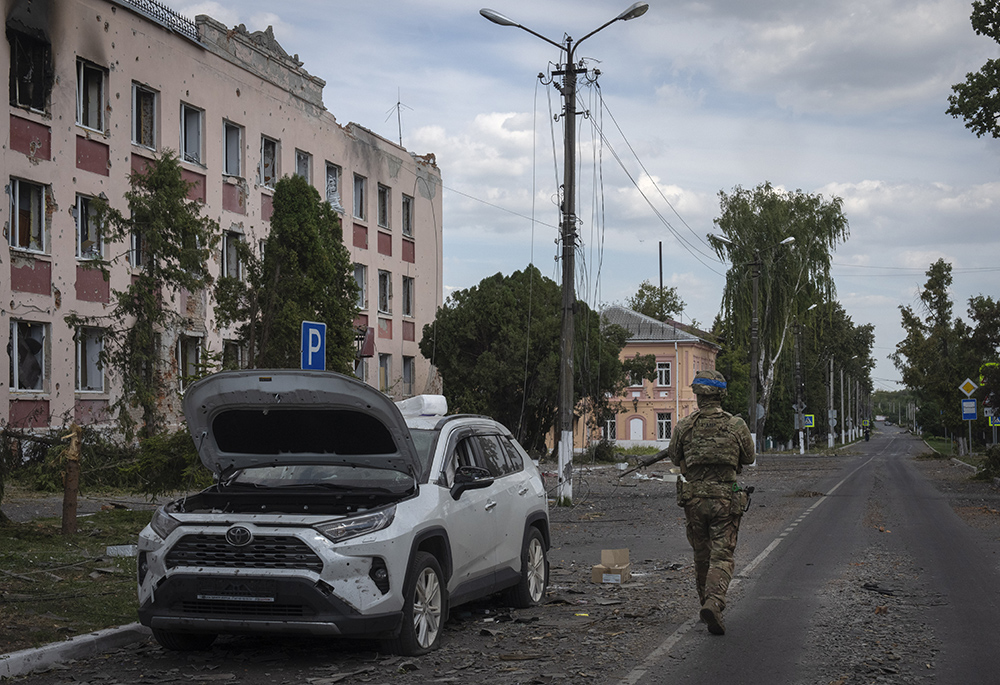
A Ukrainian soldier walks past at a city hall in Sudzha, Kursk region, Russia, on Aug. 16, 2024. The Associated Press noted that this image was approved by the Ukrainian Defense Ministry before publication. (AP photo)
When Ukrainian troops smashed their way into western Russia on Aug. 6, overwhelming defenses and forcing thousands to flee, it seemed the world had been caught by surprise.
Two weeks on, with Kyiv's forces occupying hundreds of square miles of Russian territory, Catholics in both countries are reeling from the sudden turnaround — and pondering what it could portend for Moscow's strongman, Vladimir Putin, and for the chance of a negotiated end to the war.
"If the best form of defense is sometimes attack, this is a great advance for the Ukrainian army — something to bargain with for a just peace," explained Auxiliary Bishop Jan Sobilo of Kharkiv-Zaporizhzhia, from whose diocese the incursion was launched. "Russians are now learning for themselves how it feels to be under fire, and what a terrible, cruel thing war is. Maybe they'll start pressuring Putin and his government to stop it."
The bishop spoke with NCR as Ukrainian forces consolidated control over dozens of villages in Russia's Kursk region, destroying key supply bridges and toppling a statue of Vladimir Lenin in the bullet-riddled town of Sudzha. He said the daring operation had lifted public morale after months of exhausting frontline deadlock, accompanied by constant Russian drone and missile strikes on Ukrainian population centers.
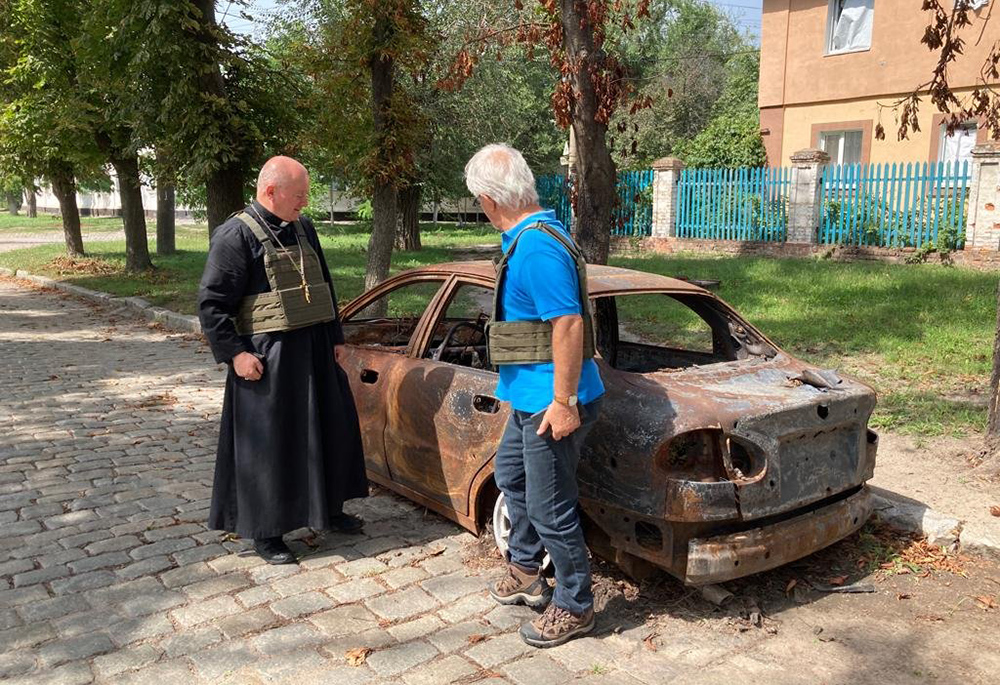
Auxiliary Bishop Jan Sobilo of Kharkiv-Zaporizhzhia, Ukraine, looks at a destroyed vehicle in in the summer of 2022 in the eastern Ukrainian region covered by the diocese. (OSV News photo/Courtesy of Jan Sobilo)
Meanwhile, a leading Russian lay Catholic told NCR the sight of civilians fleeing their homes had been "terrible and frightening," but said events around Kursk also provided "a good illustration of responsibility."
"We're now seeing how all the evil Putin has brought into the world is turning against Russia," said the Catholic, who asked not to be named. "Unfortunately, the people now suffering didn't decide about starting this war, but are now bearing collective guilt for it — whereas those who did launch the war continue to live peacefully with their families under military protection."
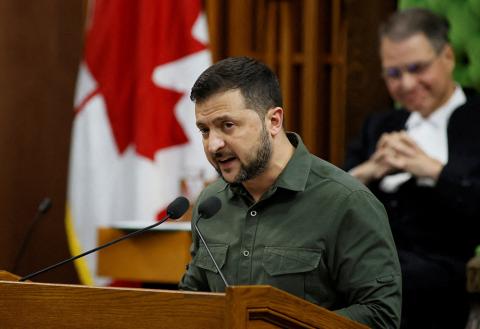
Ukrainian President Volodymyr Zelenskyy addresses the Canadian House of Commons on Parliament Hill, Sept. 22, 2023, in Ottawa, Ontario. (OSV News/Blair Gable, pool via Reuters)
In a weekend social media post, President Volodymyr Zelenskyy said his forces were strengthening their grip over occupied areas after taking POWs, adding that the aim had been "limiting Russia's offensive potential."
As Russia rushed in reinforcements, however, Vladimir Putin told a televised meeting with defense officials last week (Aug. 12) that Ukraine was "perpetrating crimes" and would "undoubtedly face a strong response."
Among anguished Russian Orthodox Church reactions, Patriarch Kirill — who strongly supports Putin's actions in Ukraine — accused Ukrainian troops of targeting places of worship and killing civilians and praised "examples of true heroism and courage" shown by endangered residents. "I received news of the significantly worsened situation in the Kursk region with great emotional pain and deep concern," the patriarch said in a statement. "I pray for the salvation of all those at the center of this tragedy, for speedy recovery of the wounded and consolation for relatives of the dead."
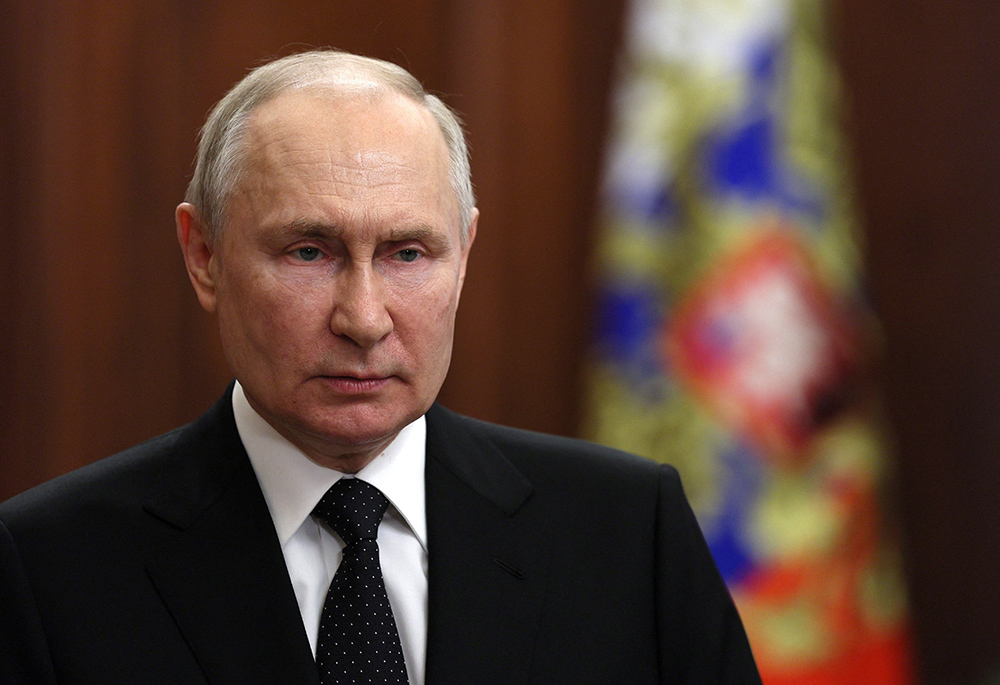
Russian President Vladimir Putin gives a televised address June 24, 2023, in Moscow, Russia. (OSV News/Reuters/Sputnik/Kremlin/Gavriil Grigorov)
The Moscow Patriarchate said it had set up a shelter at Kursk's Holy Trinity monastery for displaced villagers, in cooperation with Russia's Ministry for Emergencies, while sending icons from the Russian capital's military Resurrection cathedral for a religious procession against Ukrainian forces.
The head of the Russian Orthodox Church's Kursk Archdiocese, Metropolitan Herman (Moralin), said monks at the 17th-century St. Nicholas Belogorsky Monastery, near Sudzha, had left after the site was hit by a Ukrainian drone. "The situation is extremely dangerous, tense and alarming — the enemy forces are significant, but the authorities are working efficiently," the metropolitan told Kirill in an open letter.
The secretary-general of the Russian Catholic bishops' conference, Jesuit Fr. Stephan Lipke, told NCR he hoped to reach out to members of Kursk's small Catholic parish.
"Although the fighting is some way from there, the city itself is affected by drone and missile strikes, and is receiving many refugees," Lipke told NCR. "Public reaction to this incursion among Catholics has ranged from anger to shock, although I have the impression that people outside the affected areas aren't paying that much attention."
Advertisement
Meanwhile, the lay Catholic said she and her friends recognized that Ukraine was engaged in a valid "method of defense," but were also concerned about human suffering. "For most people here, ideological differences have become unimportant — Russians haven't yet lost the capacity to feel the pain of others," said the Catholic, a university lecturer working as a Caritas volunteer.
"Of course, Ukraine has a right to take any action, including an attack, to defend itself from an aggressor — and maybe Russians who previously supported the war will now think more seriously about it. On the other hand, many who previously condemned the war, or at least avoided talking about it, have now joined those defending it, seeing a real threat to their lives and loved ones," she said.
Although the small area of Russia now occupied can't be compared to the approximately 20% of Ukraine occupied by Moscow, the incursion has highlighted the tactical skill of Ukrainian forces, set against Russia's flawed intelligence and command systems, and could provide Kyiv with a key bargaining chip, especially for future prisoner exchanges.
Some Ukrainians are cautious.
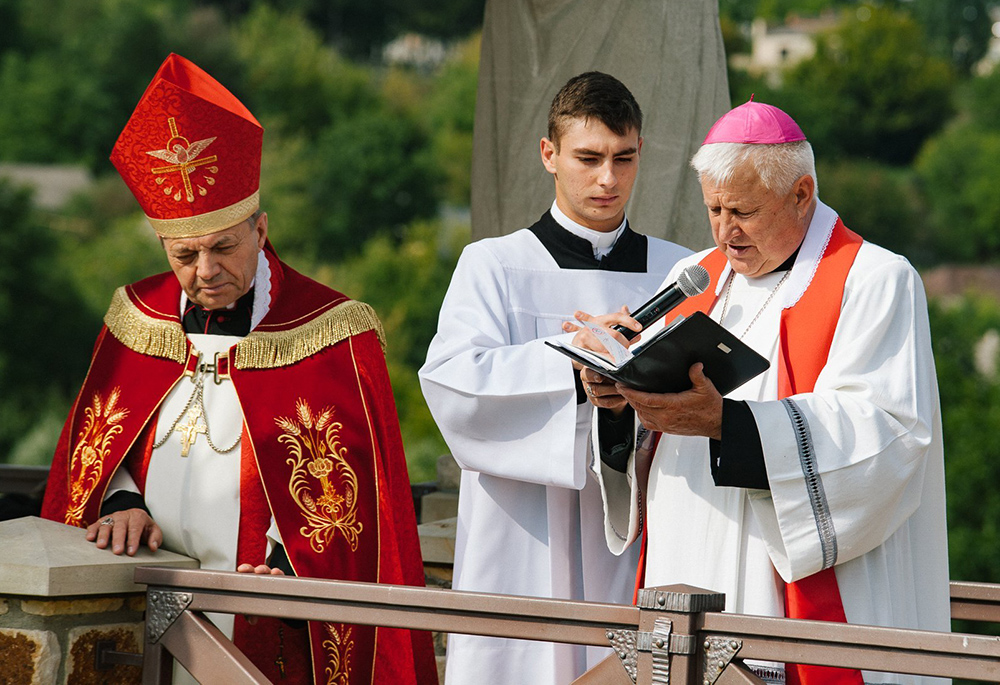
Bishops Leon Dubrawskyi of Kamianets-Podilskyi and Stanislav Szyrokoradiuk of Odesa-Simferopol concelebrate an outdoor Mass, Sept. 14, 2022, in Shargorod, Ukraine. The Mass was in celebration of the special day of prayer for Ukraine and the end of the Latin-rite bishops' Year of the Holy Cross. (CNS/Vyacheslav Sokolovy)
"As a bishop, I can't evaluate military and political operations like this — we're simply praying for this war and the Russian threat to end," Bishop Stanislav Szyrokoradiuk of Odessa-Simferopol, whose Black Sea diocese has faced numerous Russian bombardments, insisted in an NCR interview. "Nor are we interested in how many of our enemies die. Every war and act of aggression is a profound evil — but how best to defend against them is a question for our military commanders."
Sobilo, the northern auxiliary bishop, said there is a chance the Ukrainian incursion will hasten an end to the war. "I hope this attack on Kursk will accelerate peace by bringing it closer to the negotiating table. In the meantime, Russians are being taught an important moral lesson about what it means when an occupier enters another country without reason," the bishop told NCR.
For now, with over 35,000 civilians already killed or injured, according to the United Nations, and bloody Russian assaults continuing further south, Ukrainian sufferings look set to continue.
In August, Save the Children said child casualties from the war had increased by 40% in the first seven months of 2024, with 633 children now confirmed dead and 1,551 injured, according to data from the Office of High Commissioner for Human Rights. The United Nations Children's Fund, or UNICEF, stated in August that "more than two years of destruction and displacement" had robbed "many children inside and outside of Ukraine" of "their education and happiness."
In a social media message for his country's annual Youth Day, the head of Ukraine's independent Orthodox church, Metropolitan Epiphany (Dumenko), said young Ukrainians had been "forced to grow up very early," and urged them not to allow the evil of war to "kill bright hopes and the desire to do good."
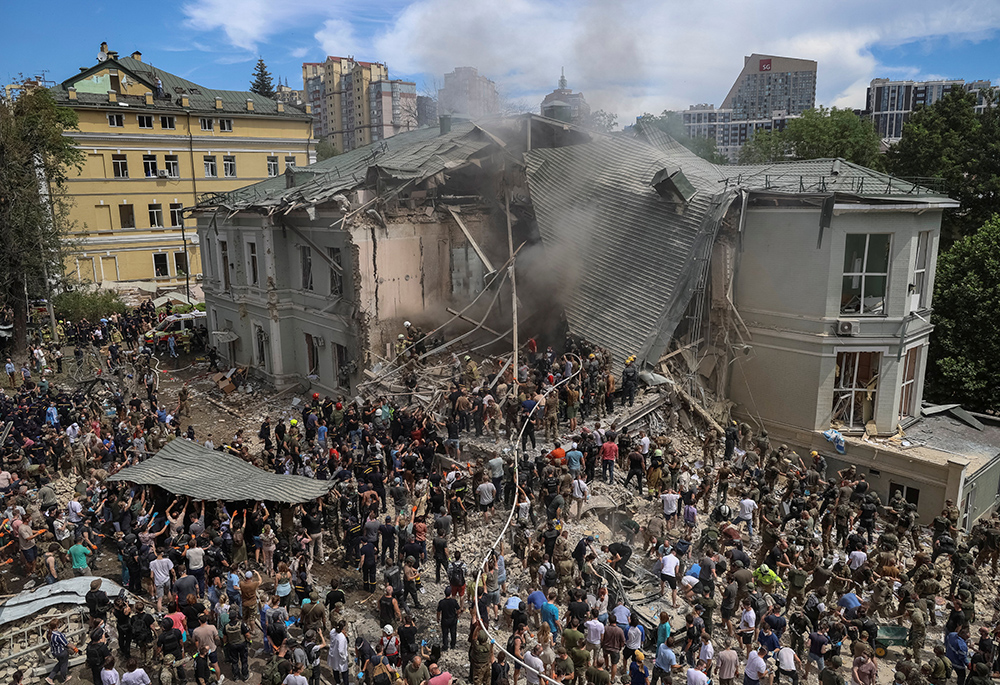
Rescuers work at Okhmatdyt Children's Hospital in Kyiv, Ukraine's capital, July 8, after it was severely damaged during Russian missile strikes amid Russia's war on Ukraine. At least 31 were killed and over 135 injured as Russian bombers pummeled Kyiv and numerous other cities throughout the nation that day with more than 40 missiles and guided aerial bombs, with one striking the large children's hospital. (OSV News/Reuters/Oleksandr Ratushniak)
At the same time, in a statement after talks with Zelenskyy on Aug. 16, Ukraine's Council of Churches and Religious Organizations, far from sympathizing with Russian Orthodox grievances, accused Patriarch Kirill's Moscow Patriarchate of justifying "pogroms and restrictions on religious freedom," and of "cynically trampling God's decrees and elementary standards of universal morality."
"We categorically condemn the activities of the Russian Orthodox Church, which has become an accomplice in the Russian invaders' bloody crimes against humanity," said the council, which includes Catholic, Orthodox and Protestant leaders, as well as Jews and Muslims, "and which sanctifies weapons of mass destruction and openly declares the need to destroy Ukrainian statehood, culture and identity."
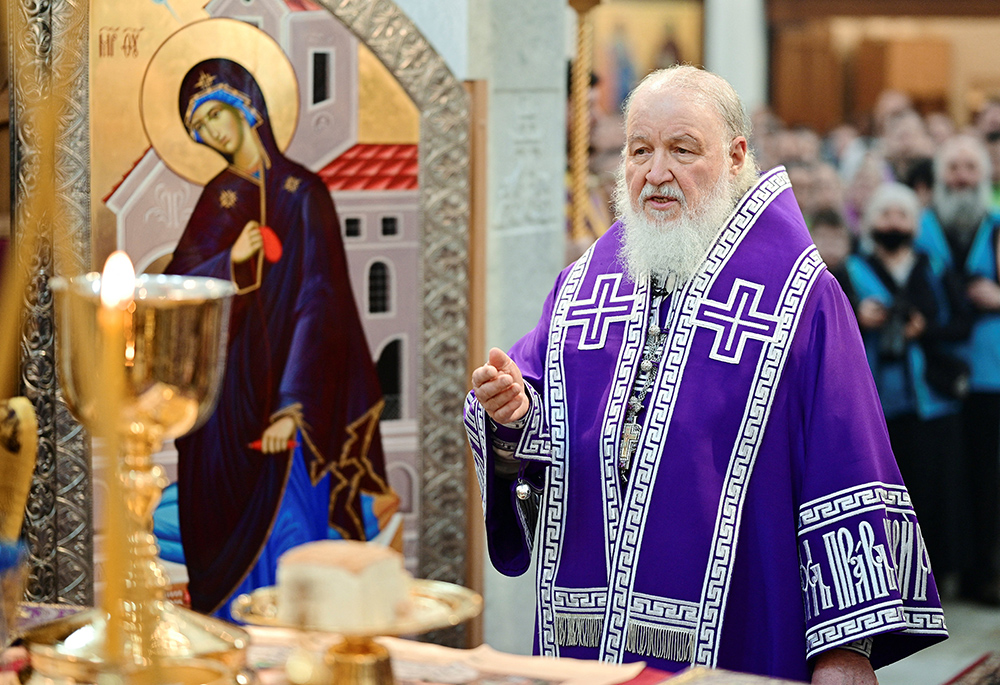
Russian Orthodox Patriarch Kirill of Moscow leads a cathedral consecration service April 10, 2022, in Moscow. (OSV News/Reuters/Patriarchal Press Service/Oleg Varaov)
In Russia, the lay Catholic regrets that her own church has been forced into silence over the war and says she's shocked that many Catholic priests with Russian citizenship still "support the current policy of the Russian state."
Lipke, the Russian bishops' conference secretary-general, isn't sure how Ukraine's incursion will affect public attitudes to the "special military operation," which has already left, by some estimates, over half a million Russian soldiers dead or wounded. With many fearing peace could now be even further away, he thinks Russian and Ukrainian Catholics should look to their "common faith."
In Ukraine, Sobilo agrees. "I'd turn to our Catholic brethren in Russia, as well as to the Orthodox, with the simple message that war is the worst thing that can ever happen in the world, leaving people to suffer and die, and ruining all prospects for the young generation," the Kharkiv-Zaporizhzhia auxiliary told NCR.
"Bombs and missiles don't ask whether it's Catholics, Orthodox, Protestants or non-believers who are in their path," he said. "That's why everyone, whatever their faith, should have been shouting loudly and fearlessly against this war from the outset. Yet this still isn't happening, even now after all the destruction, with so many Russian soldiers killed, women left childless, wives widowed, and children orphaned."








